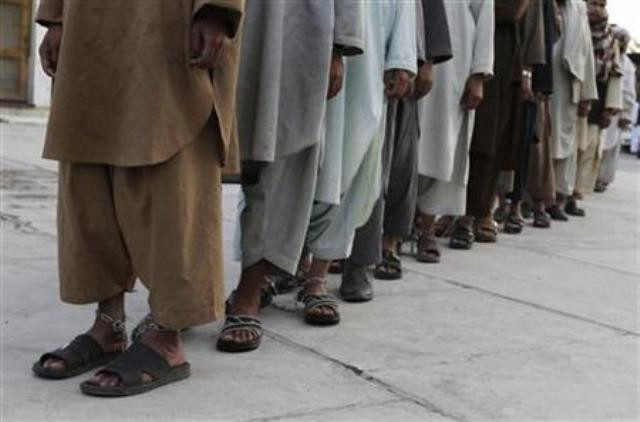242 Pakistanis in Saudi jails as they can’t pay fines
Fines range between Rs8,000 and Rs2.2m, Senate panel told
PHOTO: REUTERS/ FILE
ISLAMABAD:
Around 114 Pakistanis are languishing in jail in Riyadh and 128 in Jeddah because they are unable to pay fines ranging between Rs8,000 and Rs2.2 million and overall 3,000 are imprisoned in Saudi Arabia for various criminal offences, the Senate Functional Committee on Human Rights was told on Thursday.
Ministry of Foreign Affairs’ Additional Secretary (Middle East) Nadeem Khan informed the committee that Mureed Abbas, a Pakistani who was in a Saudi prison for the last three years over non-payment of fine, went to kingdom to work as a driver and had an accident for which he was imprisoned and fined. His sponsor had made a claim of 27,000 Saudi riyals.
“The ministry is trying to obtain information about the Kafeel and then we will work for having the fine waived off,” he added.
New policy to restrict political prisoners’ meeting
The additional secretary said the government was trying to assist the prisoners but could not pay all the fines.
The committee members expressed their surprise that despite commitment at the highest level and repeated reminders by the Pakistani government, Saudi Arabia had not yet shared the lists of prisoners who would be released.
The committee members suggested that Pakistanis going abroad should be trained to behave in accordance with the law of the country where they were planning to work and a fund should be maintained for paying their fines.
The committee also observed that the human rights ministry maintained a fund to pay for prisoners belonging to the vulnerable segments of society but it was permissible only for those within the country.
The Senate body considered working out a proposal to introduce an amendment to Pakistan Penal Code or any other relevant law to bring the overseas prisoners under its ambit.
The committee was informed that there was a similar fund maintained by the Ministry of Overseas Pakistanis Foundation as well as a welfare fund maintained by missions abroad but they were for different purposes and could not be used to pay fines.
The Senate panel decided to hold a briefing on human rights fund and write to the provincial governments asking them to contribute to these efforts.
The ministry was also directed to call an inter-ministerial meeting to review the available resources and formulate a mechanism.
The Ministry of Interior told the Senate body that such an inter-ministerial committee was already working in the Foreign Office and its recommendations could be sought. The Senate panel decided to call the members of the committee in its next meeting along with their recommendations.
Iraq detaining thousands in 'degrading' conditions: HRW
On the decrease of admission quota for students from Balochistan in the Punjab University, the vice chancellor told the panel that a meeting of the academic council had been called on July 8. When the council sends its recommendations to the vice chancellor, a meeting of the syndicate can be called for their approval.
“I can only take up the matter and the decision has to be made by the academic council and syndicate,” he added.
The vice chancellor said he had not found the figure of 106 students in records and the only duly approved decision was of one seat for a student from Balochistan in each department of the university.
The Punjab Higher Education Department special secretary suggested exploring the possibility of reserving seats for students from Balochistan in other public and private sector universities in Punjab.
The proposal was appreciated by the committee.
The meeting was held under the chairmanship of Senator Mustafa Nawaz Khokhar at the Parliament House. Other members of the committee present at the meeting included Senators Muhammad Tahir Bizenjo, Kamran Micheal, Usman Khan Kakar and Dr Jehanzeb Jamaldini.

COMMENTS (1)
Comments are moderated and generally will be posted if they are on-topic and not abusive.
For more information, please see our Comments FAQ